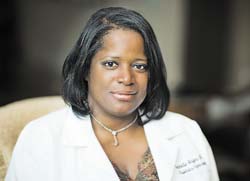HEALTHIER YOU: Black women and ovarian cancer
September 15, 2021 by agutting@reviewjournal.com
Filed under Health
Black women and ovarian cancer
BY DR. ANNETTE MAYES, OB/GYN
Ovarian cancer is perhaps one of the most dangerous diseases, because more than 80% of these cases are diagnosed in late stages. At that point, there’s also the chance that the cancer has metastasized — or spread to other parts of the body — very quickly, often without the patient knowing. It is also the fifth-leading cause of cancer deaths among women — with more than 22,000 U.S. women facing a potential diagnosis in the next few years, and around 15,000 dying from it.
If it’s caught at an early stage (Stage 1-2), however, a woman has more than a 90 percent chance of long-term survival. Only about 20 percent of cases are caught in their early stage when the disease is most curable.
Although it seems Black women have a lower incidence rate of ovarian cancer than their white counterparts, it is ultimately unclear due to the fact that ovarian cancer detection tests are not always sensitive enough for African-American women — who are shown to have lower levels of circulating ovarian cancer markers (like the CA 125 protein), which makes it difficult for many tests to measure.
Key signs and symptoms of ovarian cancer that women should be aware of include: bloating, pelvic or stomach pain, backaches, changes in eating habits or feeling full quickly, constipation, menstrual changes and pain during sex, according to The National Ovarian Cancer Coalition. While these signs aren’t direct indicators of cancer, if they continue for more than 14 days, women should pay close attention and immediately mention their concerns to an OB/GYN.
Since the symptoms of ovarian cancer can easily be conflated with other minor health issues, the fact remains that these often-overlooked symptoms contribute heavily to ovarian cancer’s high rate of diagnoses at an advanced stage — thus requiring more aggressive, rigorous and invasive methods of treatment.
Another contributing factor to the disproportionate treatment in the Black community is that most African American patients aren’t aware of their family’s medical history.
For more information, call Las Vegas All Women’s Care at (702) 522-9640. Or visit us at 700 Shadow Lane #165 in Las Vegas.






